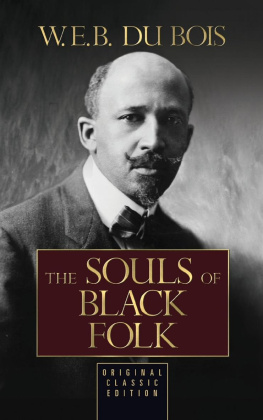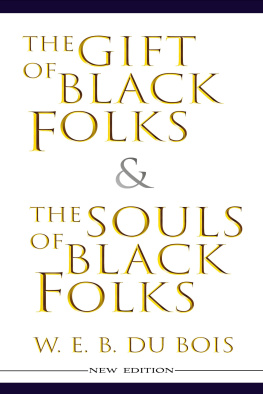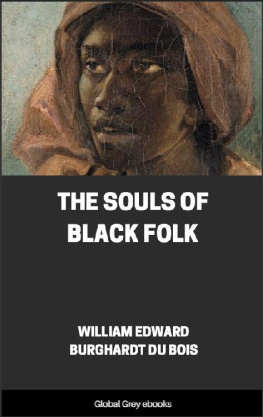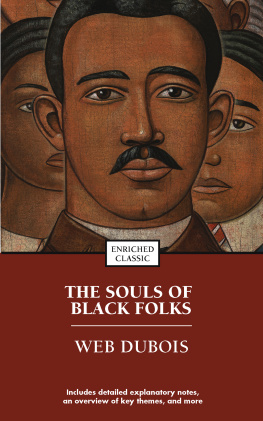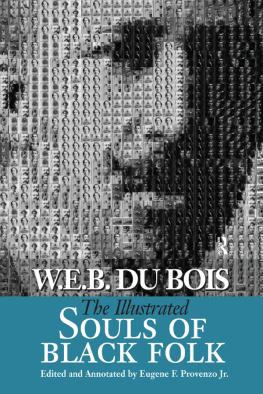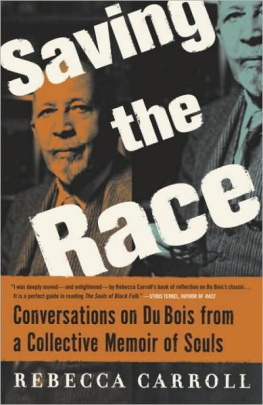
The Souls of W. E. B. Du Bois
Great Barrington Books
Bringing the old and new together in the spirit of W. E. B. Du Bois

An imprint edited by Charles Lemert

Titles Available
Keeping Good Time: Reflections on Knowledge, Power, and People
by Avery F. Gordon (2004)
Going Down for Air: A Memoir in Search of a Subject
by Derek Sayer (2004)
The Souls of Black Folk 100th Anniversary Edition
by W. E. B. Du Bois, with commentaries by Manning Marable, Charles Lemert, and Cheryl Townsend Gilkes (2004)
Sociology After the Crisis, Updated Edition
by Charles Lemert (2004)
Subject to Ourselves
by Anthony Elliot (2004)
The Protestant Ethic Turns 100: Essays on the Centenary of the Weber Thesis
edited by William H. Swatos, Jr., and Lutz Kaelber (2005)
Seeing Sociologically: The Routine Grounds of Social Action
by Harold Garfinkel, edited and introduced by Anne Rawls (2005)
Discourses on Liberation: An Anatomy of Critical Theory
by Kyung-Man Kim (2005)
The Souls of W. E. B. Du Bois
by Alford A. Young, Jr., Jerry G. Watts, Manning Marable, Charles Lemert, and Elizabeth Higginbotham (2006)
Forthcoming
Thinking the Unthinkable:
An Introduction to Social Theories
by Charles Lemert
The Souls of W. E. B. Du Bois
by Alford A. Young Jr., Jerry G. Watts, Manning Marable, Charles Lemert, and Elizabeth Higginbotham
First published 2006 by Paradigm Publishers
Published 2016 by Routledge
2 Park Square, Milton Park, Abingdon, Oxon OX14 4RN
711 Third Avenue, New York, NY 10017, USA
Routledge is an imprint of the Taylor & Francis Group, an informa business
Copyright 2006, Taylor & Francis.
All rights reserved. No part of this book may be reprinted or reproduced or utilised in any form or by any electronic, mechanical, or other means, now known or hereafter invented, including photocopying and recording, or in any information storage or retrieval system, without permission in writing from the publishers.
Notice:
Product or corporate names may be trademarks or registered trademarks, and are used only for identification and explanation without intent to infringe.
Library of Congress Cataloging-in-Publication Data
The Souls of W. E. B. Du Bois
p. cm.
Includes bibliographical references and index.
ISBN 1-59451-137-3 (hc) ISBN 1-59451-138-1 (pb)
Designed and Typeset by Straight Creek Bookmakers.
ISBN 13 : 978-1-59451-137-0 (hbk)
ISBN 13 : 978-1-59451-138-7 (pbk)
Contents
Alford A. Young, Jr.
Manning Marable
Elizabeth Higginbotham
Alford A. Young, Jr.
Charles Lemert
Jerry G. Watts
Index
Alford A. Young, Jr.
Today, slightly more than one hundred years since the publication of his classic work The Souls of Black Folk, it may not seem surprising if some are compelled to say out loud, What more is there to say about W. E. B. Du Bois and this great work? In fact, despite some efforts to say more about Du Bois and that scholarly endeavor, there still remains much that is unsaid, or at least understated, about The Souls of Black Folk. Some of what should be said concerns the extent to which Du Bois strove to generate a conversation not only with a broader audience in academia and the American public but also within and across his own body of scholarship, where Souls stands as a centerpiece. Accordingly, what needs to be said, debated, and advanced concerns the means by which Du Bois called upon the research and analytical tools available at the time of his writing, regardless of whether they fit neatly within a social scientific or humanities canon, to explore and extrapolate upon the situation of black Americans in the nascent industrial hegemon that was the United States at the beginning of the twentieth century. The Souls of Black Folk was a heroic effort to address this concern by providing a pivotal commentary that was spun toward a range issues, concerns, and questions such that one has to consider Souls not only as a document of great internal sophistication but also as one that reaches out to other parts of Du Boiss scholarship and other parts of his professional life. While some books have been written about Du Bois and his efforts concerning The Souls of Black Folk, rarely has it been the case that a complete volume aims to vigorously explore the relationship of Souls to Du Boiss other writings at the beginning of the twentieth century. The Souls of W. E. B. Du Bois aims to do that very work. It is a collection of essays exploring the relationship of W. E. B. Du Boiss seminal publication, The Souls of Black Folk, to other works in his scholarly portfolio and to his personal project concerning race, racial identity, and the social objectives of scholarly engagement.
The Souls of Black Folk is often taken, and quite legitimately so, as a stand-alone publication elucidating Du Boiss turn-of-the-century thinking about the existential foundations of the African American community and the African American social condition. Yet, Souls also serves as one of a series of critical commentaries by Du Bois on these and other themes. As the authors of The Souls of W. E. B. Du Bois demonstrate, these commentaries are in conversation with each other. Hence, rather than providing internal critiques of the ideas and arguments introduced in Souls, the essays in this book offer pointed assessments of how Souls extends, refines, or introduces ideas considered in Du Boiss The Philadelphia Negro and Black Reconstruction and of how Souls relates to Du Boiss early considerations of social activism on the behalf of African Americans and to his thinking about the situation of African American women. A little more than one hundred years after the publication of The Souls of Black Folk, these essays demonstrate how significant Souls is for Du Boiss overarching objectives concerning racial theorizing, the social conditions affecting African Americans at the turn of the century, and the possibilities for social justice.
One of the most compelling aspects of The Souls of Back Folk is the very title of the work. Du Boiss use of the term souls compels one to think about what it means to be a black American (whether the reader happens to occupy that status or not), and the experience of reading that work also motivates one to think about how Du Bois took stock of his own situation as a black American. Each of the essays in The Souls of W. E. B. Du Bois employs or emphasizes some notion of soul in developing its argument. In most cases, this is done by exploring how Du Boiss soul (or, to put in other words, his sense of self) lingers throughout his work on projects aside from the writing of The Souls of Black Folk. Hence, the title of this book, The Souls of W. E. B. Du Bois


 An imprint edited by Charles Lemert
An imprint edited by Charles Lemert 



